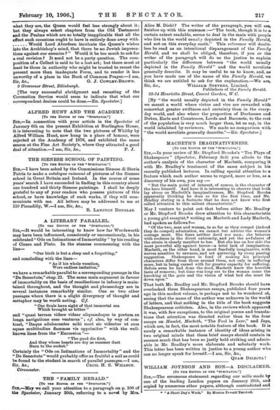MACBETH'S IMAGINATIVENESS.
[TO TILE EDITOR OF THE " SPECTATOR." J
SIR,—In your review of Mr. Stopford Brooke's "Ten Plays of Shakespeare" (Spectator, February 3rd) you allude to the author's analysis of the character of Macbeth, comparing it with Mr. Bradley's treatment of the same subject in his recently published lectures. In calling special attention to a feature which each author seems to regard, more or less, as a discovery of his own, you say :-
" But the main point of interest, of course, is the character of the hero himself. And hero it is interesting to observe that both lay stress on Macbeth's imaginativeness, Mr. Stopford Brooke apparently thinking he does so for the first time, and Mr. Bradley stating in a footnote that he does not know who first called attention to this salient characteristic."
May I venture to point out that before either Mr. Bradley or Mr. Stopford Brooke drew attention to this characteristic
a young girl essayist,* writing on Macbeth and Lady Macbeth, had spoken as follows P-
" Of the two, man and woman, in so far as they compel (indeed they do compel) admiration, we cannot but admire the woman's courage most. She fears neither devil nor man ; she behaves with coolness in the direst extremity, and yet the awfulness of the strain is clearly manifest to her. But she has on her side the most powerful ally against terror—a total lack of imagination. Macbeth, on the other hand, is most fearfully imaginative, with nerves sensitive to rawness, and set quivering by every passing suggestion. Shakespeare is fond of making his principal characters differ from those around them, not only in suffering more, but in being cursed with far greater capacity for suffering. Before even he had done the deed, Macbeth knew the horrible taste of remorse; but time was long ere to the woman came the knocking at the gate and the vision of what bed she must lie down upon."
That both Mr. Bradley and Mr. Stopford Brooke should have overlooked these Shakespearean essays, published four years ago in this modest volume, is perhaps not to be wondered at, seeing that the name of the author was unknown in the world of letters, and that nothing in the title of the book suggests Shakespearean criticism. Also, in the reviews which appeared it was, with few exceptions, to the original poems and transla- tions that attention was directed rather than to the four essays on Hamlet, Macbeth, " The Fool in Lear," and Iago, which are, in fact, the most notable feature of the book. It is surely a remarkable instance of identity of ideas arising in two original minds that these brief essays should contain in essence much that has been so justly held striking and admir- able in Mr. Bradley's more elaborate and scholarly work.
This letter has been written in justice to a young author who can no longer speak for herself.—I am, Sir, &c.,
QUAM DILECTA !










































 Previous page
Previous page